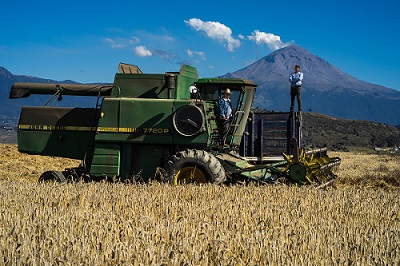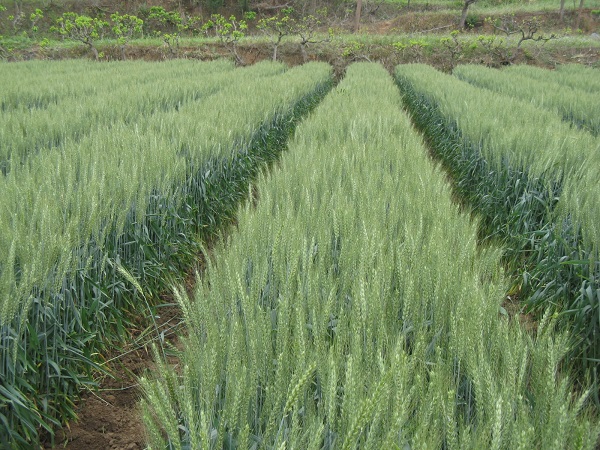
EL BATAN, Mexico (CIMMYT) – A new study examines how networks help spread new technologies and innovations in agriculture.
The study’s authors focused on the dissemination of innovations relating to conservation agriculture (CA) – practices based on the principles of minimal soil disturbance, permanent soil cover and crop rotation – and studied farmers working with Mexico’s Sustainable Modernization of Traditional Agriculture Initiative (MasAgro).
Current population trends and current climate change projections suggest that food insecurity is likely to rise. Farmer responsiveness to new practices and technologies will play a crucial role in determining if there will be adequate food production.
The study found that farmers mainly learn about new practices from each other through internal networks, but that depending on the type of information, may look beyond their close groups for input from research institutions and other external resources. In CA, producers mainly learn about machinery, crop rotation, minimum tillage and weeding from each other, but rely on research institutions for information about biofertilizers and pests. When information is obtained from external networks, producers tend to adopt new practices on a step by step basis, rather than as a collective uptake.
The majority of farmers in the study area adopted two to four CA practices, with only 21.5 percent of producers adopting an array of five or more CA practices, and less than ten percent adopting one or no practices. The most commonly adopted CA practices are those which reduce labor costs, increase yields and improve soil fertility such as weed management, use of quality seed and minimum tillage practices. The authors noted that many more farmers were willing to adopt a comprehensive CA package, but were hindered by a lack of resources and access to specialized machinery.
The results show that innovation diffusion must happen along several dimensions, through the first stage of innovation to adoption and adapting innovations to meet needs. These dimensions dynamically interact, and determine the dissemination of new ideas.
Producers rely on key actors within their internal networks to identify useful innovations, and on their entire internal network to spread the message. The study’s authors stated that there is an urgent need to establish networks that focus on creating pathways for sharing knowledge, information and practices among actors at different levels.
MasAgro is an initiative led by the International Maize and Wheat Improvement Center (CIMMYT) and Mexico’s Secretary of Agriculture, Livestock, Rural Development, Fisheries and Food (SAGARPA).
Read the full study “Innovation diffusion in Conservation Agriculture: a network approach” and check out other recent publications from CIMMYT staff below.
- Impact of conservation agriculture on growth and development of rice-wheat and maize-wheat cropping system in western Indo-Gangetic plains. 2016. Choudhary, K.M., Nandal, D.P., Jat, M.L., Hooda, J.S., Verma, K.C. In: Annals of biology, vol.32, no.2 p.174-177.
- Impact of informal groundwater markets on efficiency of irrigated farms in India: a bootstrap data envelopment analysis approach. 2016. Manjunatha, A.V., Speelman, S. Aravindakshan, S., Amjath-Babu, T.S., Puran Mal In: Irrigation Science, vol.34, p.41-52.
- Implications of high temperature and elevated CO2 on flowering time in plants. 2016. Jagadish, K.S.V., Bahuguna, R.N. Djanaguiraman, M. Gamuyao, R. Prasad, V.P.V. Craufurd, P. In: Frontiers in Plant Science, vol.7, no. 913.
- Irrigation water saving through adoption of direct rice sowing technology in the Indo-Gangetic Plains: empirical evidence from Pakistan. 2016. Ali, A., Dil Bahadur Rahut, Erenstein, O. In: Water Practice and Technology, vol. 11, no. 3, p. 610-620.
- Identification and validation of single nucleotide polymorphic markers linked to Ug99 stem rust resistance in spring wheat. 2017. Long-Xi Yu, Shiaoman Chao Singh, R.P. Sorrells, M.E. In: PLoS One, v.12, no.2: e0171963.
- Identification of heat tolerant wheat lines showing genetic variation in leaf respiration and other physiological traits. 2017. Suzuky Pinto, R., Molero, G., Reynolds, M.P. In: Euphytica, v. 213, no. 76, p.1-15.
- Impacts of changing weather patterns on smallholder well-being: evidence from the Himalayan region of northern Pakistan. 2017. Ali, A., Dil Bahadur Rahut, Erenstein, O. In: International Journal of Climate Change Strategies and Management, v. 9, no. 2, p. 225-240.
- Implications of less tail end water on livelihoods of small farmers in Pakistan. 2017. Ali, A., Dil Bahadur Rahut, Imtiaz, M. In: Outlook on Agriculture, vol. 46, no. 1, p. 36-43.
- Improving agricultural knowledge management: The AgTrials experience. 2017. Hyman, G., Espinosa, H., Camargo, P., Abreu, D., Devare, M., Arnaud, E., Porter, C., Mwanzia, L., Sonder, K., Traore, S. In: F1000 Research, vol. 6, no. 317.


 Innovations
Innovations